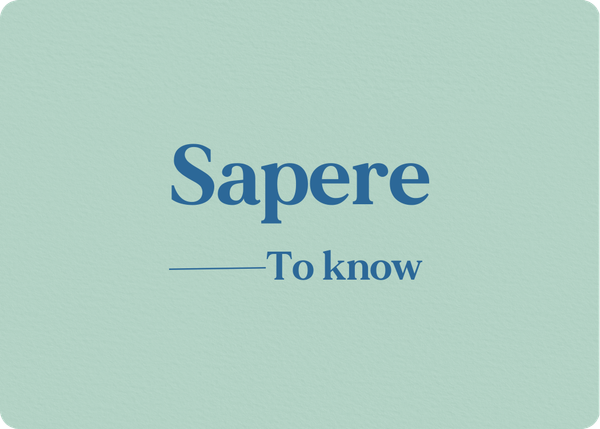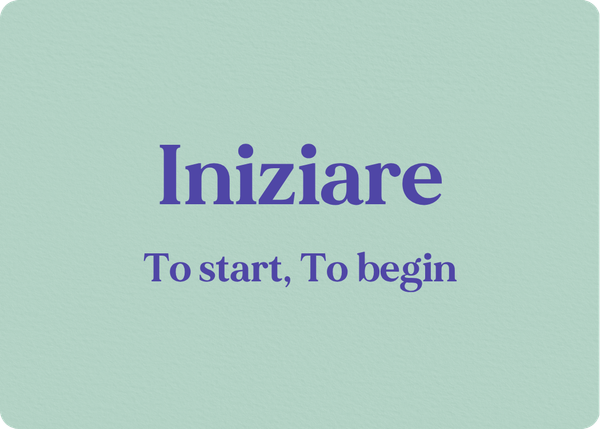What is Sapere?
Sapere is an irregular Italian verb meaning "to know", "to know how to", or "to be able to". It belongs to the second conjugation (-ERE verbs) but follows irregular patterns in some tenses. This verb is useful for expressing knowledge, ability, and skills in Italian conversation and is commonly used to indicate what someone knows or can do.
Key Features of Sapere:
- Type: Irregular second conjugation verb (-ERE)
- Meaning: To know, to know how to, to be able to
- Irregularities: Present tense (so, etc.), simple past (seppi, etc.), future (saprò), present subjunctive (sappia), conditional (saprei), imperative (sappi)
- Auxiliary verb: Uses "avere" (to have) for conjugation in compound tenses
- Past participle: Saputo
Indicativo – Indicative Mood
Presente (Present Tense)
| Person | Conjugation |
|---|---|
| io | so |
| tu | sai |
| lui/lei | sa |
| noi | sappiamo |
| voi | sapete |
| loro | sanno |
Example:
Amerigo sa parlare cinque lingue.
Amerigo can speak five languages.
Passato Prossimo (Present Perfect)
| Person | Conjugation |
|---|---|
| io | ho saputo |
| tu | hai saputo |
| lui/lei | ha saputo |
| noi | abbiamo saputo |
| voi | avete saputo |
| loro | hanno saputo |
Example:
Ieri abbiamo saputo tutta la verità su quella storia.
Yesterday we found out the whole truth about that story.
Imperfetto (Imperfect)
| Person | Conjugation |
|---|---|
| io | sapevo |
| tu | sapevi |
| lui/lei | sapeva |
| noi | sapevamo |
| voi | sapevate |
| loro | sapevano |
Example:
Da piccolo sapevo il nome di tutti i dinosauri.
When I was little, I knew the names of all the dinosaurs.
Trapassato Prossimo (Past Perfect)
| Person | Conjugation |
|---|---|
| io | avevo saputo |
| tu | avevi saputo |
| lui/lei | aveva saputo |
| noi | avevamo saputo |
| voi | avevate saputo |
| loro | avevano saputo |
Example:
Quando mi hai chiamato, avevo appena saputo che la festa era stata rimandata.
When you called me, I had just found out that the party had been postponed.
Passato Remoto (Simple Past)
| Person | Conjugation |
|---|---|
| io | seppi |
| tu | sapesti |
| lui/lei | seppe |
| noi | sapemmo |
| voi | sapeste |
| loro | seppero |
Example:
In quel momento particolare della loro vita, seppero affrontare la situazione con coraggio.
At that particular moment in their lives, they were able to face the situation with courage.
Trapassato Remoto (Past Anterior)
| Person | Conjugation |
|---|---|
| io | ebbi saputo |
| tu | avesti saputo |
| lui/lei | ebbe saputo |
| noi | avemmo saputo |
| voi | aveste saputo |
| loro | ebbero saputo |
Example:
Dopo che ebbero saputo la notizia, partirono immediatamente.
After they had learned the news, they left immediately.
Futuro Semplice (Simple Future)
| Person | Conjugation |
|---|---|
| io | saprò |
| tu | saprai |
| lui/lei | saprà |
| noi | sapremo |
| voi | saprete |
| loro | sapranno |
Domani sapremo i risultati dell'esame.
Tomorrow we will know the exam results.
Futuro Anteriore (Future Perfect)
| Person | Conjugation |
|---|---|
| io | avrò saputo |
| tu | avrai saputo |
| lui/lei | avrà saputo |
| noi | avremo saputo |
| voi | avrete saputo |
| loro | avranno saputo |
Example:
Appena avrò saputo dove si terrà l’incontro, te lo comunicherò.
As soon as I find out where the meeting will be, I’ll let you know.
Congiuntivo – Subjunctive Mood
Presente (Present Subjunctive)
| Person | Conjugation |
|---|---|
| che io | sappia |
| che tu | sappia |
| che lui/lei | sappia |
| che noi | sappiamo |
| che voi | sappiate |
| che loro | sappiano |
Example:
Non credo che Silvia sappia guidare.
I don’t think Silvia knows how to drive.
Passato (Past Subjunctive)
| Person | Conjugation |
|---|---|
| che io | abbia saputo |
| che tu | abbia saputo |
| che lui/lei | abbia saputo |
| che noi | abbiamo saputo |
| che voi | abbiate saputo |
| che loro | abbiano saputo |
Example:
Spero che abbiate saputo gestire la situazione.
I hope you knew how to handle the situation.
Imperfetto (Imperfect Subjunctive)
| Person | Conjugation |
|---|---|
| che io | sapessi |
| che tu | sapessi |
| che lui/lei | sapesse |
| che noi | sapessimo |
| che voi | sapeste |
| che loro | sapessero |
Example:
Pensavo che tu sapessi cucinare meglio.
I thought you knew how to cook better.
Trapassato (Past Perfect Subjunctive)
| Person | Conjugation |
|---|---|
| che io | avessi saputo |
| che tu | avessi saputo |
| che lui/lei | avesse saputo |
| che noi | avessimo saputo |
| che voi | aveste saputo |
| che loro | avessero saputo |
Example:
Se loro avessero saputo dell’incontro, sarebbero venuti.
If they had known about the meeting, they would have come.
Condizionale – Conditional Mood
Presente (Present Conditional)
| Person | Conjugation |
|---|---|
| io | saprei |
| tu | sapresti |
| lui/lei | saprebbe |
| noi | sapremmo |
| voi | sapreste |
| loro | saprebbero |
Example:
Giuseppe non saprebbe vivere senza musica.
Giuseppe would not know how to live without music.
Passato (Past Conditional)
| Person | Conjugation |
|---|---|
| io | avrei saputo |
| tu | avresti saputo |
| lui/lei | avrebbe saputo |
| noi | avremmo saputo |
| voi | avreste saputo |
| loro | avrebbero saputo |
Example:
Ero certo che non avrebbero saputo mantenere il segreto.
I was sure they would not have known how to keep the secret.
Imperativo (Imperative)
| Person | Conjugation |
|---|---|
| (tu) | sappi |
| (lui/lei) | sappia |
| (noi) | sappiamo |
| (voi) | sappiate |
| (loro) | sappiano |
Example:
Sappi aspettare e otterrai i risultati che speri!
Be able to wait and you will get the results you hope for!
Indefinite Moods
Infinito (Infinitive)
- Presente: sapere (to know)
- Passato: avere saputo (to have known)
Examples:
Mi piacerebbe sapere a cosa stai pensando.
I’d like to know what you’re thinking about.
Dopo aver(e) saputo che tutto era sotto controllo si è tranquillizzata.
After finding out that everything was under control, she calmed down.
Participio (Participle)
- Presente: sapiente (wise/learned) - used as adjective and noun
- Passato: saputo (known) - also used as adjective and noun
Examples:
È una persona sapiente.
He/She is a wise person.
Ho saputo la notizia questa mattina da Lucrezia.
I found out the news this morning from Lucrezia.
Non fare il saputo con me!
Don't act like a know-it-all with me!
Gerundio (Gerund)
- Presente: sapendo (knowing)
- Passato: avendo saputo (having known)
Examples:
Ho preso questa decisione sapendo bene di correre un rischio.
I made this decision knowing full well that I was taking a risk.
Avendo saputo che era in difficoltà, gli ho offerto aiuto.
Having learned that he was in trouble, I offered him help.
The verb Sapere at a glance: Key tenses you need
| Present | Present Perfect | Imperfect | Present Subjunctive | Imperfect Subjunctive | Present Conditional |
|---|---|---|---|---|---|
| io so | io ho saputo | io sapevo | che io sappia | che io sapessi | io saprei |
| tu sai | tu hai saputo | tu sapevi | che tu sappia | che tu sapessi | tu sapresti |
| lui/lei sa | lui/lei ha saputo | lui/lei sapeva | che lui/lei sappia | che lui/lei sapesse | lui/lei saprebbe |
| noi sappiamo | noi abbiamo saputo | noi sapevamo | che noi sappiamo | che noi sapessimo | noi sapremmo |
| voi sapete | voi avete saputo | voi sapevate | che voi sappiate | che voi sapeste | voi sapreste |
| loro sanno | loro hanno saputo | loro sapevano | che loro sappiano | che loro sapessero | loro saprebbero |
Conclusion
Mastering the conjugation of "sapere" useful for expressing knowledge, awareness, and ability in Italian. This irregular verb requires memorization of its unique forms, particularly the highly irregular present tense (so, etc.), simple past forms (seppi, etc.), and future/conditional stems (sapr-).
Remember the key points:
- Uses "avere" as auxiliary verb for conjugation in compound tenses
- Irregular in some tenses
- Past participle is "saputo"
- Can mean both "to know" (facts) and "to know how to" (skills)
- Different from "conoscere" - sapere is for facts/abilities, conoscere is for people/places
Keep practicing with real sentences and contextual examples to master this Italian verb!





